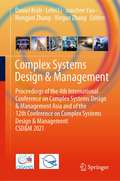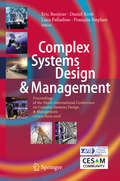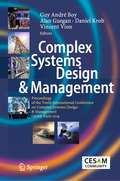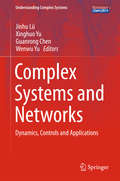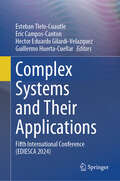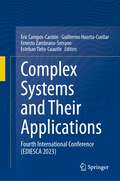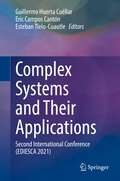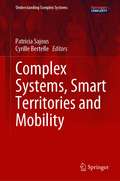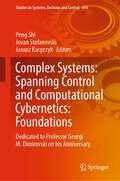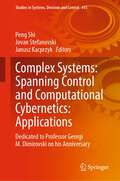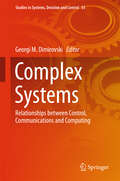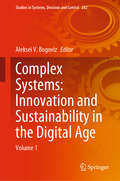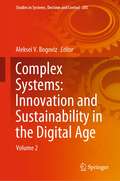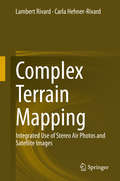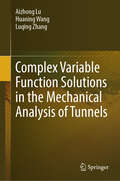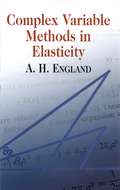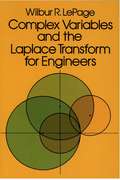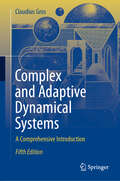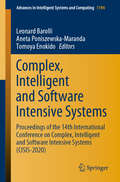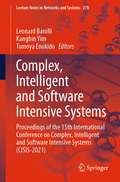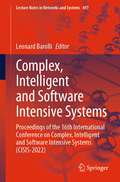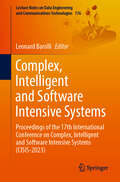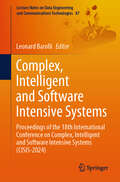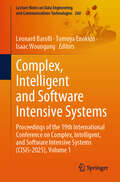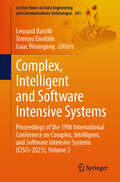- Table View
- List View
Complex Systems Design & Management: Proceedings of the 4th International Conference on Complex Systems Design & Management Asia and of the 12th Conference on Complex Systems Design & Management CSD&M 2021
by Daniel Krob Xinguo Zhang Lefei Li Junchen Yao Hongjun ZhangThis book contains all refereed papers accepted during the fourth asia-pacific edition & twelve edition – which were merged this year – of the CSD&M conference that took place in Beijing, People’s Republic of China by 2021. Mastering complex systems requires an integrated understanding of industrial practices as well as sophisticated theoretical techniques and tools. This explains the creation of an annual go-between European and Asian forum dedicated to academic researchers & industrial actors working on complex industrial systems architecting, modeling & engineering. These proceedings cover the most recent trends in the emerging field of complex systems, both from an academic and professional perspective. A special focus was put this year on “Digital Transformation in Complex Systems Engineering”. CESAM Community The CSD&M series of conferences are organized under the guidance of CESAM Community, managed by CESAMES. CESAM Community aims in organizing the sharing of good practices in systems architecting and model-based systems engineering (MBSE) and certifying the level of knowledge and proficiency in this field through the CESAM certification. The CESAM systems architecting & model-based systems engineering (MBSE) certification is especially currently the most disseminated professional certification in the world in this domain through more than 1,000 real complex system development projects on which it was operationally deployed and around 10,000 engineers who were trained on the CESAM framework at international level.
Complex Systems Design & Management: Proceedings of the Ninth International Conference on Complex Systems Design & Management, CSD&M Paris 2018
by Daniel Krob Eric Bonjour François Stephan Luca PalladinoThis book contains all refereed papers accepted during the ninth edition of the conference that took place at the Cité Internationale Universitaire de Paris on December 18-19, 2018.Mastering complex systems requires an integrated understanding of industrial practices as well as sophisticated theoretical techniques and tools. This explains the creation of an annual go-between forum in Paris dedicated to academic researchers & industrial actors working on complex industrial systems architecture, modeling & engineering.These proceedings cover the most recent trends in the emerging field of Complex Systems, both from an academic and a professional perspective. A special focus is put on “Products & services development in a digital world”. The CSD&M Paris 2018 conference is organized under the guidance of CESAM Community (http://cesam.community/en). CESAM Community has been developed since 2010 by the non-profit organization CESAMES Association to organize the sharing of good practices in Enterprise and Systems Architecture and to certify the level of knowledge and proficiency in this field through CESAM certification.
Complex Systems Design & Management: Proceedings of the Tenth International Conference on Complex Systems Design & Management, CSD&M Paris 2019
by Guy André Boy Daniel Krob Alan Guegan Vincent VionThis book contains all refereed papers accepted during the tenth edition of the conference that took place at the Cité Internationale Universitaire de Paris on December 12-13, 2019. Mastering complex systems requires an integrated understanding of industrial practices as well as sophisticated theoretical techniques and tools. This explains the creation of an annual go-between forum in Paris dedicated to academic researchers & industrial actors working on complex industrial systems architecture, modeling & engineering. These proceedings cover the most recent trends in the emerging field of Complex Systems, both from an academic and a professional perspective. A special focus is put on “Systems Engineering through the ages”. The CSD&M Paris 2019 conference is organized under the guidance of CESAM Community. It has been developed since 2010 by the non-profit organization CESAMES Association to organize the sharing of good practices in Enterprise and Systems Architecture and to certify the level of knowledge and proficiency in this field through CESAM certification.
Complex Systems and Networks: Dynamics, Controls and Applications (Understanding Complex Systems)
by Guanrong Chen Jinhu Lü Xinghuo Yu Wenwu YuThis elementary book provides some state-of-the-art research results on broad disciplinary sciences on complex networks. It presents an in-depth study with detailed description of dynamics, controls and applications of complex networks. The contents of this book can be summarized as follows. First, the dynamics of complex networks, for example, the cluster dynamic analysis by using kernel spectral methods, community detection algorithms in bipartite networks, epidemiological modeling with demographics and epidemic spreading on multi-layer networks, are studied. Second, the controls of complex networks are investigated including topics like distributed finite-time cooperative control of multi-agent systems by applying homogenous-degree and Lyapunov methods, composite finite-time containment control for disturbed second-order multi-agent systems, fractional-order observer design of multi-agent systems, chaos control and anticontrol of complex systems via Parrondos game and many more. Third, the applications of complex networks provide some applicable carriers, which show the importance of theories developed in complex networks. In particular, a general model for studying time evolution of transition networks, deflection routing in complex networks, recommender systems for social networks analysis and mining, strategy selection in networked evolutionary games, integration and methods in computational biology, are discussed in detail.
Complex Systems and Their Applications: Fifth International Conference (EDIESCA 2024)
by Esteban Tlelo-Cuautle Guillermo Huerta-Cuellar Eric Campos-Canton Hector Eduardo Gilardi-VelazquezThis book compiles select articles presented during the Fifth Meeting for Dissemination and Research in the Study of Complex Systems and their Applications (EDIESCA 2024). EDIESCA arises from the need to foster academic and research groups that carry out scientific research and further technological development at the national and international level. The meeting promotes participation among graduate students, industry specialists, and researchers to establish collaborations on the study of complex systems and their applications that may have a strong impact on the development of new projects. The study and characterization of systems with non-linear and/or chaotic behavior has been of great interest to researchers around the world, for which various applications have been developed. The dynamic study of chaotic systems of different models, for example, such as Rössler, Lorenz, and Chua to name a few, has generated important advances in areas of research on chemical reactions, meteorological behavior, design of electronic devices, and other applications. Among the best-known results, the study of systems that show multistability and hidden attractors has been a subject of interest in recent years, generating new lines for research.
Complex Systems and Their Applications: Fourth International Conference (EDIESCA 2023)
by Esteban Tlelo-Cuautle Eric Campos-Cantón Guillermo Huerta-Cuellar Ernesto Zambrano-SerranoThis book is a compilation of scientific articles written by recognized researchers participating in the Fourth Conference on the Study of Complex Systems and their Applications (EDIESCA 2023), held in Monterrey, Mexico. EDIESCA arose from the need for academic and research groups that carry out this scientific research to disseminate their results internationally. The study and characterization of systems with non-linear and/or chaotic behavior has been of great interest to researchers around the world, for which many important results have been obtained with various applications. The dynamic study of chaotic oscillators of different models, such as Rössler, Lorenz, and Chua, has generated important advances in the understanding of chemical reactions, meteorological behavior, design of electronic devices, and other applications. Topics at the event included applications for communications systems by masking techniques, financial behavior, networks analysis, nonlinear lasers, numerical modeling, electronic design, and other interesting topics in the area of complex systems. Additionally, there are results on numerical simulation and electronic designs to generate complex dynamic behaviors.
Complex Systems and Their Applications: Second International Conference (EDIESCA 2021)
by Esteban Tlelo-Cuautle Guillermo Huerta Cuéllar Eric Campos CantónThis book is a compilation of scientific articles written by recognized researchers, and select students, participating in the Second Conference on the Study of Complex Systems and their Applications (EDIESCA 2021). EDIESCA 2021 arose from the need for academic and research groups that carry out this scientific research to disseminate their results internationally. The study and characterization of systems with non-linear and/or chaotic behavior has been of great interest to researchers around the world, for which many important results have been obtained with various applications. The dynamic study of chaotic oscillators of different models, such as Rössler, Lorenz, and Chua, has generated important advances in understanding of chemical reactions, meteorological behavior, design of electronic devices, and other applications. Topics at the event included applications for communications systems by masking techniques, financial behavior, networks analysis, nonlinear lasers, numerical modeling, electronic design, and other interesting topics in the area of complex systems. Additionally, there are results on numerical simulation and electronic designs to generate complex dynamic behaviors.
Complex Systems, Smart Territories and Mobility (Understanding Complex Systems)
by Patricia Sajous Cyrille BertelleThis book reflects the outcome of contribution by the plural community and of the interactions between disciplines. With the mass of data available through Information and Communication Technologies (ICT) in an unprecedented quantity since the Human History, it is now possible to access dimensions of knowledge that, though not hidden, could not be grasped in the same way in the past. The question of how this information can be used for the benefit of institutional and economic actors to foster the development of a territory. Tackling the issue from a resolutely interdisciplinary perspective, the authors explore the theories and methods of complex systems in order to discuss how they can contribute in these new circumstances to territorial intelligence and to the development practices in which it is embodied. This book illustrates how today’s research explores the multiple facets of territorial systems in order to reproduce their richness. It invites readers to learn about the challenges, ideas, results and advances present in this domain.
Complex Systems: Dedicated to Professor Georgi M. Dimirovski on his Anniversary (Studies in Systems, Decision and Control #414)
by Peng Shi Janusz Kacprzyk Jovan StefanovskiThis book, dedicated to Professor Georgi M. Dimirovski on his anniversary, contains new research directions, challenges, and many relevant applications related to many aspects within the broadly perceived areas of systems and control, including signal analysis and intelligent systems. The project comprises two volumes with papers written by well known and very active researchers and practitioners. The first volume is focused on more foundational aspects related to general issues in systems science and mathematical systems, various problems in control and automation, and the use of computational and artificial intelligence in the context of systems modeling and control. The second volume is concerned with a presentation of relevant applications, notably in robotics, computer networks, telecommunication, fault detection/diagnosis, as well as in biology and medicine, and economic, financial, and social systems too.
Complex Systems: Dedicated to Professor Georgi M. Dimirovski on his Anniversary (Studies in Systems, Decision and Control #415)
by Peng Shi Janusz Kacprzyk Jovan StefanovskiThis book, dedicated to Professor Georgi M. Dimirovski on his anniversary, contains new research directions, challenges, and many relevant applications related to many aspects within the broadly perceived areas of systems and control, including signal analysis and intelligent systems. The project comprises two volumes with papers written by well known and very active researchers and practitioners. The first volume is focused on more foundational aspects related to general issues in systems science and mathematical systems, various problems in control and automation, and the use of computational and artificial intelligence in the context of systems modeling and control. The second volume is concerned with a presentation of relevant applications, notably in robotics, computer networks, telecommunication, fault detection/diagnosis, as well as in biology and medicine, and economic, financial, and social systems too.
Complex Systems: Relationships between Control, Communications and Computing (Studies in Systems, Decision and Control #55)
by Georgi M. DimirovskiThis book gives a wide-ranging description of the many facets of complex dynamic networks and systems within an infrastructure provided by integrated control and supervision: envisioning, design, experimental exploration, and implementation. The theoretical contributions and the case studies presented can reach control goals beyond those of stabilization and output regulation or even of adaptive control. Reporting on work of the Control of Complex Systems (COSY) research program, Complex Systems follows from and expands upon an earlier collection: Control of Complex Systems by introducing novel theoretical techniques for hard-to-control networks and systems. The major common feature of all the superficially diverse contributions encompassed by this book is that of spotting and exploiting possible areas of mutual reinforcement between control, computing and communications. These help readers to achieve not only robust stable plant system operation but also properties such as collective adaptivity, integrity and survivability at the same time retaining desired performance quality. Applications in the individual chapters are drawn from: * the general implementation of model-based diagnosis and systems engineering in medical technology, in communication, and in power and airport networks; * the creation of biologically inspired control brains and safety-critical human-machine systems, * process-industrial uses; * biped robots; * large space structures and unmanned aerial vehicles; and * precision servomechanisms and other advanced technologies. Complex Systems provides researchers from engineering, applied mathematics and computer science backgrounds with innovative theoretical and practical insights into the state-of-the-art of complex networks and systems research. It employs physical implementations and extensive computer simulations. Graduate students specializing in complex-systems
Complex Systems: Volume 1 (Studies in Systems, Decision and Control #282)
by Aleksei V. BogovizThis text provides one of the first book-length studies on the innovative and sustainable development of complex systems in the era of digital transformations, combining quantitative data from several countries with detailed qualitative accounts at the national level. In particular, the book covers the basic concepts, methods, and cutting-edge research on innovation and sustainability in complex systems. Given its scope, the book will be of great interest and value to researchers and practitioners working across the social sciences and in a diverse range of areas in complexity science. Pursuing a multidisciplinary approach, the book is also an ideal resource for advanced undergraduate and graduate level courses in complexity science, sustainability research, economics, and development studies.
Complex Systems: Volume 2 (Studies in Systems, Decision and Control #283)
by Aleksei V. BogovizThis book provides a coherent framework for understanding the essence of complex systems and the nature of digital transformations, analyzes challenges of and patterns in innovative development, and shares a wealth of insights and best practices, resulting in the most extensive coverage of the topic available.In particular, the book’s cutting-edge contributions, prepared by scientists, engineers, and field experts,focus on the design, implementation, and evaluation of practical interventions that promote the innovative and sustainable development of complex systems. In addition to sharing a rich collection of cases from around the world, they provide a broad interdisciplinary analysis of collaboration mechanisms, theories and approaches to support and accelerate the development of complex systems.
Complex Terrain Mapping: Integrated Use of Stereo Air Photos and Satellite Images
by Lambert Rivard Carla Hehner-RivardA review of five major categories of lithogenetic and morphogenetic terrain types meet the complex terrain criteria: landslides, field photos of slope failures, bedrocks, nonglacial surficial deposits, glacial and alpine-glacial, and periglacial. Interpretations are based on personal knowledge and available background materials. This monograph documents a concept of complex terrains with the use of 208 illustrations, including 64 analyzed and extensively commented examples of stereo-pair air photos and 64 related satellite images.
Complex Variable Function Solutions in the Mechanical Analysis of Tunnels
by Aizhong Lu Huaning Wang Luqing ZhangThis book covers the mechanical problems of tunnels in traffic, hydraulic and mining engineering. By extending the complex variable method in mechanical analysis, it proposes accurate analytical solutions for tunnels. The solutions are further applied to the back analysis of tunnels, hole shape optimization, support design and estimation of tunnel stability. The considered rock characteristics involve elasticity, elastoplasticity, viscoelasticity and anisotropy, and various geometric conditions are included, such as circular/noncircular single/multiple tunnels with/without support at deep/shallow depths. Some original achievements are provided, including new mapping functions for complex regions, precise determination of the noncircular plastic zone around single/twin tunnels and related elastoplastic solutions and quantitative analysis of the interaction between rock and the support, which are new developments of theory and method in rock mechanics. The proposed analyticalsolutions are reliable tools to initially estimate the design parameters and achieve optimal design, providing guidance in the conceptual stage of the design process. They can clearly reveal the influences of parameters in functional form and provide a benchmark against which the overall correctness of numerical analyses can be assessed. This book summarizes the author's research achievements over more than 20 years. It is a valuable reference for professionals working in geotechnical engineering.
Complex Variable Methods in Elasticity
by A. H. EnglandThe plane strain and generalized plane stress boundary value problems of linear elasticity are the focus of this graduate-level text, which formulates and solves these problems by employing complex variable theory. The text presents detailed descriptions of the three basic methods that rely on series representation, Cauchy integral representation, and the solution via continuation. Its five-part treatment covers functions of a complex variable, the basic equations of two-dimensional elasticity, plane and half-plane problems, regions with circular boundaries, and regions with curvilinear boundaries. Worked examples and sets of problems appear throughout the text. 1971 edition. 26 figures.
Complex Variables and the Laplace Transform for Engineers
by Wilbur R. Lepage"An excellent text; the best I have found on the subject." -- J. B. Sevart, Department of Mechanical Engineering, University of Wichita"An extremely useful textbook for both formal classes and for self-study." -- Society for Industrial and Applied MathematicsEngineers often do not have time to take a course in complex variable theory as undergraduates, yet is is one of the most important and useful branches of mathematics, with many applications in engineering. This text is designed to remedy that need by supplying graduate engineering students (especially electrical engineering) with a course in the basic theory of complex variables, which in turn is essential to the understanding of transform theory. Presupposing a good knowledge of calculus, the book deals lucidly and rigorously with important mathematical concepts, striking an ideal balance between purely mathematical treatments that are too general for the engineer, and books of applied engineering which may fail to stress significant mathematical ideas.The text is divided into two basic parts: The first part (Chapters 1-7) is devoted to the theory of complex variables and begins with an outline of the structure of system analysis and an explanation of basic mathematical and engineering terms. Chapter 2 treats the foundation of the theory of a complex variable, centered around the Cauchy-Riemann equations. The next three chapters -- conformal mapping, complex integration, and infinite series -- lead up to a particularly important chapter on multivalued functions, explaining the concepts of stability, branch points, and riemann surfaces. Numerous diagrams illustrate the physical applications of the mathematical concepts involved.The second part (Chapters 8-16) covers Fourier and Laplace transform theory and some of its applications in engineering, beginning with a chapter on real integrals. Three important chapters follow on the Fourier integral, the Laplace integral (one-sided and two-sided) and convolution integrals. After a chapter on additional properties of the Laplace integral, the book ends with four chapters (13-16) on the application of transform theory to the solution of ordinary linear integrodifferential equations with constant coefficients, impulse functions, periodic functions, and the increasingly important Z transform. Dr. LePage's book is unique in its coverage of an unusually broad range of topics difficult to find in a single volume, while at the same time stressing fundamental concepts, careful attention to details and correct use of terminology. An extensive selection of interesting and valuable problems follows each chapter, and an excellent bibliography recommends further reading. Ideal for home study or as the nucleus of a graduate course, this useful, practical, and popular (8 printings in its hardcover edition) text offers students, engineers, and researchers a careful, thorough grounding in the math essential to many areas of engineering. "An outstanding job." -- American Mathematical Monthly
Complex and Adaptive Dynamical Systems: A Comprehensive Introduction
by Claudius GrosThis textbook offers a comprehensive introduction to the concepts underpinning our modern understanding of complex and emergent behavior. Mathematical methods necessary for the discussion are introduced and explained on the run. All derivations are presented step-by-step. This new fifth edition has been fully revised and includes a new chapter, a range of new sections, figures and exercises. The Solution chapter has been reorganized for clarity.The core aspects of modern complex system sciences are presented in the first chapters, covering the foundations of network- and dynamical system theory, with a particular focus on scale-free networks and tipping phenomena. The notion of deterministic chaos is treated together with bifurcation theory and the intricacies of time delays. Modern information theoretical principles are discussed in further chapters, together with the notion of self-organized criticality, synchronization phenomena, and a game-theoretical treatment of the tragedy of the commons. The dynamical systems view of modern machine learning is presented in a new chapter.Chapters include exercises and suggestions for further reading. The textbook is suitable for graduate and advanced undergraduate students. The prerequisites are the basic mathematical tools of courses in natural sciences, computer science or engineering.
Complex, Intelligent and Software Intensive Systems: Proceedings of the 14th International Conference on Complex, Intelligent and Software Intensive Systems (CISIS-2020) (Advances in Intelligent Systems and Computing #1194)
by Leonard Barolli Tomoya Enokido Aneta Poniszewska-MarandaThis book explores three interwoven and challenging areas of research and development for future ICT-enabled applications: software intensive systems, complex systems and intelligent systems. Software intensive systems are systems that extensively interact with other systems, sensors, actuators, devices and users. More and more domains are now employing software intensive systems, e.g. the automotive sector, telecommunication systems, embedded systems in general, industrial automation systems and business applications. Moreover, the outcome of web services offers a new platform for enabling software intensive systems. Complex systems research is focused on the overall understanding of systems rather than their components. Complex systems are very much characterized by the changing environments in which they operate through their multiple internal and external interactions. They evolve and adapt through (internal and external) dynamic interactions. The development of intelligent systems and agents, which is increasingly characterized by the use of ontologies, can be beneficial for software intensive systems and complex systems alike. Accordingly, recent research in the areas of intelligent systems, robotics, neuroscience, artificial intelligence, and the cognitive sciences is essential to the future development of software intensive and complex systems.
Complex, Intelligent and Software Intensive Systems: Proceedings of the 15th International Conference on Complex, Intelligent and Software Intensive Systems (CISIS-2021) (Lecture Notes in Networks and Systems #278)
by Leonard Barolli Tomoya Enokido Kangbin YimThis book includes the proceedings of the 15th International Conference on Complex, Intelligent, and Software Intensive Systems, which took place in Asan, Korea, on July 1–3, 2021. Software intensive systems are systems, which heavily interact with other systems, sensors, actuators, devices, and other software systems and users. More and more domains are involved with software intensive systems, e.g., automotive, telecommunication systems, embedded systems in general, industrial automation systems, and business applications. Moreover, the outcome of web services delivers a new platform for enabling software intensive systems. Complex systems research is focused on the overall understanding of systems rather than its components. Complex systems are very much characterized by the changing environments in which they act by their multiple internal and external interactions. They evolve and adapt through internal and external dynamic interactions. The development of intelligent systems and agents, which is each time more characterized by the use of ontologies and their logical foundations build a fruitful impulse for both software intensive systems and complex systems. Recent research in the field of intelligent systems, robotics, neuroscience, artificial intelligence, and cognitive sciences is very important factor for the future development and innovation of software intensive and complex systems. The aim of the book is to deliver a platform of scientific interaction between the three interwoven challenging areas of research and development of future ICT-enabled applications: Software intensive systems, complex systems, and intelligent systems.
Complex, Intelligent and Software Intensive Systems: Proceedings of the 16th International Conference on Complex, Intelligent and Software Intensive Systems (CISIS-2022) (Lecture Notes in Networks and Systems #497)
by Leonard BarolliSoftware intensive systems are systems, which heavily interact with other systems, sensors, actuators, devices, other software systems, and users. More and more domains are involved with software intensive systems, e.g., automotive, telecommunication systems, embedded systems in general, industrial automation systems, and business applications. Moreover, the outcome of web services delivers a new platform for enabling software intensive systems. Complex systems research is focused on the overall understanding of systems rather than its components. Complex systems are very much characterized by the changing environments in which they act by their multiple internal and external interactions. They evolve and adapt through internal and external dynamic interactions. The development of intelligent systems and agents, which is each time more characterized by the use of ontologies and their logical foundations, builds a fruitful impulse for both software intensive systems and complex systems. Recent research in the field of intelligent systems, robotics, neuroscience, artificial intelligence, and cognitive sciences is a very important factor for the future development and innovation of software intensive and complex systems. The aim of the book “Complex, Intelligent and Software Intensive Systems” is to deliver a platform of scientific interaction between the three interwoven challenging areas of research and development of future ICT-enabled applications: software intensive systems, complex systems, and intelligent systems.
Complex, Intelligent and Software Intensive Systems: Proceedings of the 17th International Conference on Complex, Intelligent and Software Intensive Systems (CISIS-2023) (Lecture Notes on Data Engineering and Communications Technologies #176)
by Leonard BarolliThis book aims to deliver a platform of scientific interaction between the three interwoven challenging areas of research and development of future ICT-enabled applications: software intensive systems, complex systems and intelligent systems.Software intensive systems are systems, which heavily interact with other systems, sensors, actuators, devices, other software systems and users. More and more domains are involved with software intensive systems, e.g., automotive, telecommunication systems, embedded systems in general, industrial automation systems and business applications. Moreover, the outcome of web services delivers a new platform for enabling software intensive systems.Complex systems research is focused on the overall understanding of systems rather than its components. Complex systems are very much characterized by the changing environments in which they act by their multiple internal and external interactions. They evolve and adapt through internal and external dynamic interactions. The development of intelligent systems and agents, which is each time more characterized by the use of ontologies and their logical foundations, builds a fruitful impulse for both software intensive systems and complex systems. Recent research in the field of intelligent systems, robotics, neuroscience, artificial intelligence and cognitive sciences are very important factor for the future development and innovation of software intensive and complex systems.
Complex, Intelligent and Software Intensive Systems: Proceedings of the 18th International Conference on Complex, Intelligent and Software Intensive Systems (CISIS-2024) (Lecture Notes on Data Engineering and Communications Technologies #87)
by Leonard BarolliSoftware Intensive Systems are systems, which heavily interact with other systems, sensors, actuators, devices, other software systems and users. More and more domains are involved with software intensive systems, e.g. automotive, telecommunication systems, embedded systems in general, industrial automation systems and business applications. Moreover, the outcome of web services delivers a new platform for enabling software intensive systems. Complex Systems research is focused on the overall understanding of systems rather than its components. Complex Systems are very much characterized by the changing environments in which they act by their multiple internal and external interactions. They evolve and adapt through internal and external dynamic interactions. The development of Intelligent Systems and agents, which is each time more characterized by the use of ontologies and their logical foundations build a fruitful impulse for both Software Intensive Systems and Complex Systems. Recent research in the field of intelligent systems, robotics, neuroscience, artificial intelligence, and cognitive sciences are very important factor for the future development and innovation of software intensive and complex systems. The aim of the volume “Complex, Intelligent and Software Intensive Systems” is to deliver a platform of scientific interaction between the three interwoven challenging areas of research and development of future ICT-enabled applications: Software Intensive Systems, Complex systems and Intelligent Systems.
Complex, Intelligent and Software Intensive Systems: Proceedings of the 19th International Conference on Complex, Intelligent, and Software Intensive Systems (CISIS-2025), Volume 1 (Lecture Notes on Data Engineering and Communications Technologies #260)
by Isaac Woungang Leonard Barolli Tomoya EnokidoThis book aims to deliver a platform of scientific interaction between the three interwoven challenging areas of research and development of future ICT-enabled applications: Software intensive systems, complex systems, and intelligent systems.Software intensive systems are systems which heavily interact with other systems, sensors, actuators, devices, other software systems and users. More and more domains are involved with software intensive systems, e.g., automotive systems, telecommunication systems, embedded systems in general, industrial automation systems, and business applications. Moreover, the outcome of web services delivers a new platform for enabling software intensive systems. Complex systems research is focused on the overall understanding of systems rather than their components. Complex systems are very much characterized by the changing environments in which they act by their multiple internal and external interactions. They evolve and adapt through internal and external dynamic interactions.The development of intelligent systems and agents which can be characterized by ontologies and their logical foundations builds a fruitful impulse for both software intensive systems and complex systems. Recent research in the field of intelligent systems, robotics, neuroscience, artificial intelligence, and cognitive sciences are very important factors for the future development and innovation of software intensive and complex systems.
Complex, Intelligent and Software Intensive Systems: Proceedings of the 19th International Conference on Complex, Intelligent, and Software Intensive Systems (CISIS-2025), Volume 2 (Lecture Notes on Data Engineering and Communications Technologies #261)
by Isaac Woungang Leonard Barolli Tomoya EnokidoSoftware intensive systems are systems which heavily interact with other systems, sensors, actuators, devices, other software systems and users. More and more domains are involved with software intensive systems, e.g., automotive systems, telecommunication systems, embedded systems in general, industrial automation systems and business applications. Moreover, the outcome of web services delivers a new platform for enabling software intensive systems. Complex systems research is focused on the overall understanding of systems rather than their components. Complex systems are very much characterized by the changing environments in which they act by their multiple internal and external interactions. They evolve and adapt through internal and external dynamic interactions.The development of intelligent systems and agents, which can be characterized by ontologies and their logical foundations builds a fruitful impulse for both software intensive systems and complex systems. Recent researches in the field of intelligent systems, robotics, neuroscience, artificial intelligence, and cognitive sciences are very important factors for the future development and innovation of software intensive and complex systems.The aim of the book is to deliver a platform of scientific interaction between the three interwoven challenging areas of research and development of future ICT-enabled applications: software intensive systems, complex systems, and intelligent systems.
